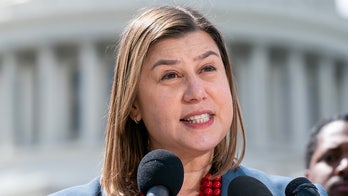
(AP)
A Maryland Republican lawmaker is trying to get his state to join others across the country in making college textbooks tax free. But he’s having trouble getting the Democrat-controlled Assembly to even vote on the measure.
“Give it a vote,” GOP Delegate Michael D. Smigiel Sr. said at a recent legislative committee hearing. “Vote it down, but give it a vote.”
If the legislation passes, Maryland would join 27 other states in offering some type of tax break for college textbooks -- including Connecticut, Missouri, New York, North Dakota, Pennsylvania, South Carolina, Tennessee and Virginia, which exempts sale tax on the purchase of them.
The Maryland proposal faces long odds, considering it has died in committee seven times since 2006, as reported by Capital News Service.
The legislation essentially states the tax break would save Maryland college students a collective $7.5 million, which equals about $80 per student, based on them paying about $1,300 each for textbooks and supplies.
However, Democrats appear to see the tax break as taking the $7.5 million away from the state’s general fund in fiscal 2015 and $9 million away by fiscal 2019.
That’s on top of lost revenue resulting from an estimated 25 to 40 percent of textbooks being purchased in ways that are not subjected to sales tax, such as through online retailer Amazon.
“Which is more important: Keeping tuition frozen or taking taxes off of textbooks?” asks Delegate Jay Walker, D- Prince George’s County, who points out state tuition could increase by 3 percent under Democratic Gov. Martin O’Malley’s budget proposal.
The most recent activity on the bill was a hearing in late January.
Smigiel appears to suggest that Maryland Democrats in failing to vote on the bill are sending a mix message about their commitment to affordable education. He did not return a message Saturday seeking comment.
Across the country, 65 percent of students don’t buy their textbooks because of the price, according to a recent report released by Maryland Public Interest Research Group.
However, the Maryland proposal has -- perhaps surprisingly -- appears to have split students.
“Tuition can be very complicated,” said Jeff Sullivan, president of the Washington College Student Government Association. “Cutting taxes for required textbooks is very simple.”
However, Katherine Mooney, a senior and president of the Salisbury University Student Government Association, disagrees.
“This is a really complex issue, and this bill won’t fix it,” she told the news service. ““We’d be taking revenue away from the state.”
For the other 19 states that offer some kind of tax break for a college textbook, some have no sales tax whatsoever, such as Delaware.
And in New Mexico, for example, the book must be bought at an “institutionally owned and operated store,” according to the National Association of College Stores.
Meanwhile, the IRS offers some relief for textbook sales essentially through three programs -- the Tuition and Fees Deduction, the American Opportunity Tax Credit or the Lifetime Learning Tax Credit.
The first allows students an annual maximum credit of $2,000 but only for required books, not those simply needed. The second has a maximum $2,500 credit and a wider definition of qualified book expenses but is available only for the first four years of higher education.
The Tuition and Fees Deduction is for those who don’t qualify for the other two programs and allows Americans to write off a maximum $4,000 for qualified higher education expenses. However, the guidelines on textbooks are similar to those for the American Opportunity Tax Credit program.




